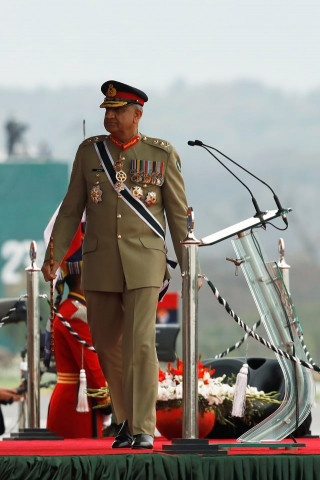‘Common minimum agenda’
The spirit guiding the opposition here is perhaps to see that the office of the COAS remains politically non-partisan

Pakistan's Army Chief of Staff General Qamar Javed Bajwa, walks as he arrives to attend the Pakistan Day military parade in Islamabad, Pakistan on March 23, 2019. PHOTO: REUTERS/FILE
In retrospect, it appears the government, in view of the numerical strength of the opposition in the National Assembly and Punjab Provincial House plus its majority in the Senate and provincial government in Sindh with the PPP, used NAB to break up these parties by creating forward blocks within the PML-N and PPP, to avert being blackmailed by coalition partners into conceding increased share in power threatening otherwise to leave the coalition, leading to the government’s collapse. Since the mainstream political opposition remained firmly intact despite the worse onslaught, the government was left with no option but to reconsider its approach and seek opposition’s cooperation. Therefore, the offer of “minimum common consensus”.
The PML-N and PPP have already responded positively to the government’s offer by extending their cooperation in getting the bill regarding the extension of the Chief of Armed Services (COAS) processed in Parliament. The spirit guiding the opposition here is perhaps to see that the office of the COAS remains politically non-partisan. The government had already made the extension of the incumbent COAS General Bajwa hugely controversial by the way it had handled the matter inside the Supreme Court and outside. Also, its decision to go to the apex court for a review, then deciding on Wednesday to bring the necessary bill to the NA as per the SC’s ruling and next pleading on Thursday for the SC ruling to stay until a decision on the review petition is reached indicate the ruling party, especially its main legal eagles appear to know not how best to handle the case which further deepened the controversy surrounding the COAS office.
The sincerity of the ruling coalition with regard to its offer of “minimum common agenda” would be tested when its three-member team led by Defence Minister Pervez Khattak discusses with the opposition the possibility of redrafting the NAB Ordinance to make it a consensus document. The opposition has already rejected in its present form alleging that the timing and text of the ordinance were meant to provide relief exclusively to the PM’s “friends” who the opposition believes were certain to be implicated in the alleged fraud in Peshawar BRT and Malam Jabba projects. The opposition has on occasions criticised the 90-day detention period which it wants to be reduced to no more than two weeks; it has also objected to non-availability of bail at the accountability court stage.
Meanwhile, PTI seems to have taken rather seriously the PPP’s attempts to woo MQM offering the Muttahida equal ministries in the province as it has in the centre if it left the ruling coalition. In what appears to be a countermove to ensure MQM’s loyalties, Planning Minister Asad Umar promised the MQM to release at the earliest Karachi’s share of resources to fund the Karachi Development package.
Published in The Express Tribune, January 4th, 2020.
Like Opinion & Editorial on Facebook, follow @ETOpEd on Twitter to receive all updates on all our daily pieces.















COMMENTS
Comments are moderated and generally will be posted if they are on-topic and not abusive.
For more information, please see our Comments FAQ